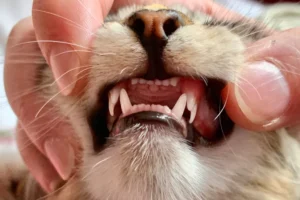Cats are known for their agile movements, curious nature, and distinct behaviors. However, if you’ve noticed your cat’s gums cracking, it can be a cause for concern. Understanding why a cat’s gums crack is important for their overall health and well-being.
Cats’ gums may crack due to a variety of reasons, including dental issues, dehydration, nutritional deficiencies, or underlying health conditions.
Importance of Oral Health in Cats
Maintaining good oral hygiene in cats is crucial for their overall well-being. Just like us, our furry feline friends can also suffer from a range of dental issues if their teeth and gums are not properly cared for. Cracked gums in cats can be a sign of underlying problems that need attention.
When a cat’s gums crack, it can indicate periodontal disease, gingivitis, or even tooth decay. These common dental problems can cause discomfort, pain, and even lead to more serious health issues if left untreated. Keeping an eye on your cat’s oral health is essential to catch any potential problems early on.
One way to prevent cracked gums and other dental issues is by regularly brushing your cat’s teeth and providing dental treats or toys to promote good oral hygiene. Additionally, scheduling regular veterinary dental check-ups can help catch any problems before they worsen.
Remember, a healthy mouth leads to a happy cat! Stay proactive in caring for your cat’s oral health to ensure they live a long and healthy life.
Common Dental Problems in Cats
Cracked gums in cats can be a symptom of various dental issues that require attention. Periodontal disease is a common problem among cats, which occurs when plaque and bacteria build up along the gum line, leading to inflammation and potential gum cracking.
Gingivitis is another culprit for cracked gums in cats. This condition is characterized by red, swollen gums that can also be painful for your furry friend. Without proper care, gingivitis can progress to more severe dental issues.
Tooth decay, also known as cavities, can also contribute to cracked gums and overall oral discomfort for cats. Providing dental chews and ensuring your cat’s diet supports dental health can help prevent such issues.
If you notice your cat’s gums are cracked, it’s essential to consult with your veterinarian promptly. Early intervention can prevent further complications and ensure your cat’s oral health is in top shape.
Remember, a little care now can go a long way in keeping your cat healthy and happy!
Signs and Symptoms of Cracked Gums
If you notice your cat’s gums looking red or inflamed, bad breath that doesn’t seem to go away, excessive drooling, or even difficulty eating, these could be signs of cracked gums. Just like humans, cats can experience gum issues that can lead to discomfort and pain.
Preventive Measures for Healthy Gums
To keep your feline friend’s gums in top shape, make sure they have regular dental check-ups to catch any issues early on. Providing proper nutrition through quality food and ensuring they stay hydrated can also help maintain healthy gums. Remember, prevention is key when it comes to your cat’s dental health.
- Brush regularly: While it may be a challenge, brushing your cat’s teeth can significantly reduce the risk of gum-related issues.
- Dental treats: Consider incorporating dental treats into your cat’s diet to promote dental health.
- Chew toys: Providing appropriate chew toys can help keep your cat’s teeth and gums healthy.
- Regular vet visits: Schedule regular check-ups with your veterinarian to monitor your cat’s dental health closely.
By taking these preventive measures, you can help keep your cat’s gums healthy and prevent the discomfort that comes with cracked gums.
For further information on feline dental care, you can refer to the American Veterinary Medical Association’s guidelines on dental care for cats: AVMA Dental Care Guidelines.
Treatment Options for Cracked Gums
If your cat is experiencing cracked gums, it’s crucial to seek treatment from a veterinarian promptly. Dental cleanings are often recommended to remove any buildup of plaque or tartar that may be causing irritation. In more severe cases, antibiotics may be necessary to address any infection present. Additionally, addressing any underlying health issues that may be contributing to the cracked gums is essential for proper healing.
In some instances, cracked gums may be a symptom of a more serious dental problem such as periodontal disease. In such cases, professional dental cleaning under anesthesia may be necessary to thoroughly clean the teeth and gums. This procedure is best performed by a veterinarian experienced in dental care for cats to ensure the safety and well-being of your feline friend.
It’s important to remember that cracked gums can cause discomfort for your cat and may lead to further health issues if left untreated. Therefore, seeking veterinary care as soon as you notice any signs of cracked gums, such as bleeding or swelling, is crucial. Early detection and treatment can prevent the problem from worsening and help your cat maintain good oral health.
Importance of Veterinary Care
When it comes to your cat’s health, regular veterinary care is essential for maintaining their overall well-being. If you notice any signs of cracked gums in your feline companion, it’s important to seek veterinary care promptly. A veterinarian can assess the severity of the issue, provide appropriate treatment, and give you guidance on how to prevent future problems.
Early detection of cracked gums can help prevent further complications and ensure that your cat receives the necessary care promptly. Without proper treatment, cracked gums can lead to more serious dental issues, such as gum disease or tooth decay. By working with a veterinarian, you can address the problem effectively and ensure that your cat’s oral health remains in top condition.
In addition to seeking veterinary care for cracked gums, it’s essential to maintain a regular dental care routine for your cat at home. This includes brushing their teeth regularly, providing dental treats or toys, and scheduling routine dental cleanings as recommended by your veterinarian. By staying proactive about your cat’s dental health, you can help prevent issues such as cracked gums and keep them happy and healthy for years to come.
Fun Facts About Cat Dental Health
Did you know that cats have 30 teeth in their mouths? That’s right, those tiny jaws are hiding quite a bit of dental work! These teeth are essential for your furry friend to eat, groom themselves, and even to defend themselves in the wild. Taking care of their dental hygiene is crucial for their overall health and well-being.
You might be surprised to learn that dental disease is one of the most common health issues in cats. Just like humans, cats can develop plaque, tartar, and gum disease if their teeth are not properly cared for. Regular brushing and dental check-ups can go a long way in preventing these issues and keeping your cat’s mouth healthy.
One interesting fact about cat dental health is that cats are masters at hiding their pain. Even if your cat is suffering from dental issues like cracked gums, they may not show obvious signs of discomfort. This is why it’s crucial to pay attention to any changes in their eating habits, bad breath, or drooling, as these could be signs of dental problems that need to be addressed.
Overall, keeping your cat’s teeth clean and healthy is an essential part of being a responsible pet owner. By providing proper dental care and regular check-ups, you can help prevent issues like cracked gums and ensure that your feline friend stays happy and healthy for years to come.
Why Do Cat Gums Crack?
Have you ever noticed your cat’s gums looking cracked or dry? This could be a sign of dehydration or a lack of essential nutrients in their diet. Just like humans, cats need to stay hydrated and eat a balanced diet to maintain healthy gums and teeth.
In some cases, cracked gums could also be a sign of a more serious underlying issue, such as periodontal disease or an infection. If you notice persistent cracks or changes in your cat’s gum health, it’s essential to consult with your veterinarian for a proper diagnosis and treatment plan.
To help prevent cracked gums in your cat, make sure they have access to fresh water at all times and provide a diet rich in nutrients that support dental health. Regular dental check-ups and professional cleanings can also help catch any issues early on and prevent more significant problems down the line.
Remember, your cat’s oral health is just as important as their overall well-being. By staying proactive and observant, you can help keep those gums healthy and your furry friend happy.
Alex, a passionate animal lover, has experience in training and understanding animal behavior. As a proud pet parent to two dogs and three cats, he founded AnimalReport.net to share insights from animal experts and expand his knowledge of the animal kingdom.




